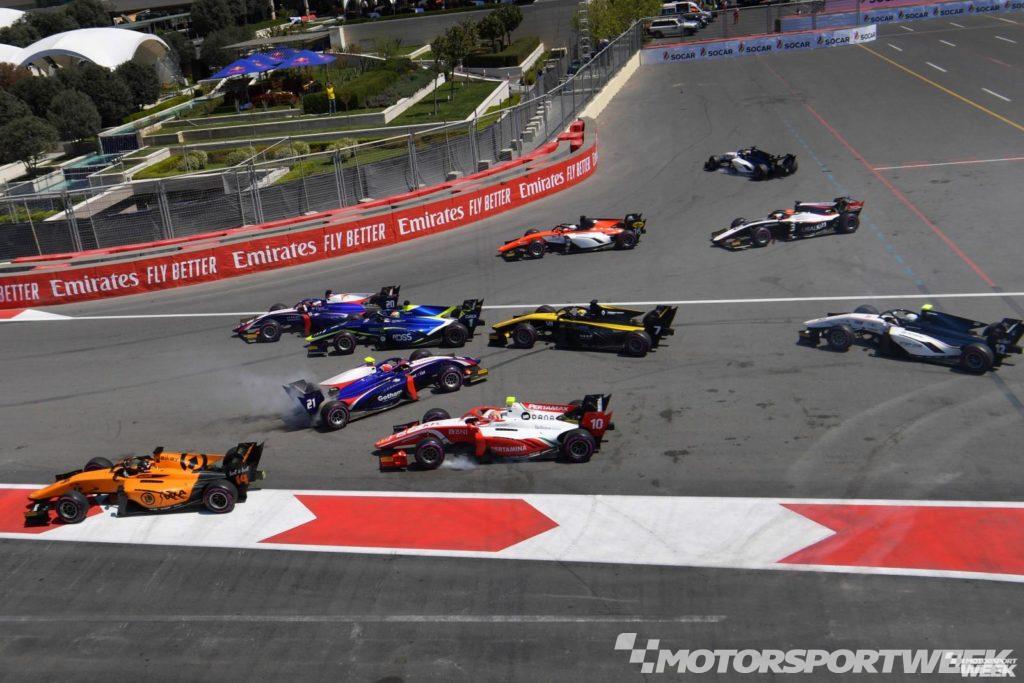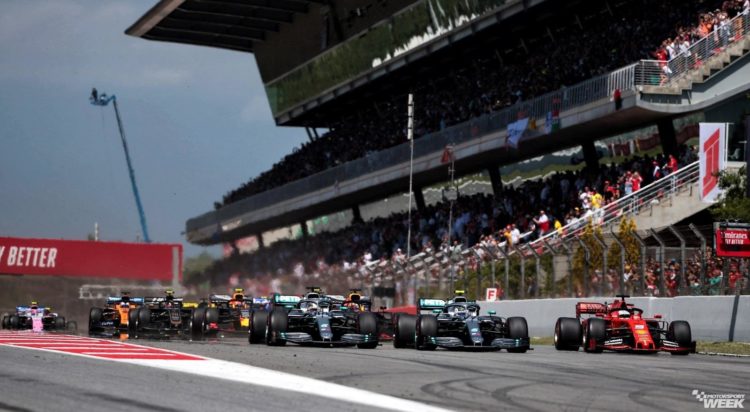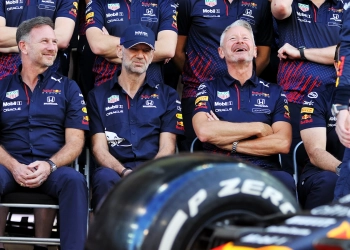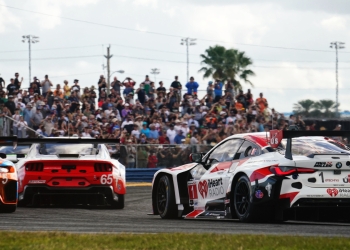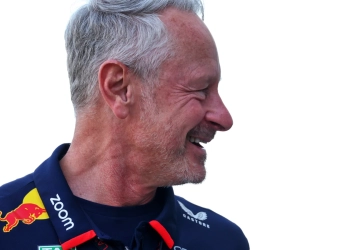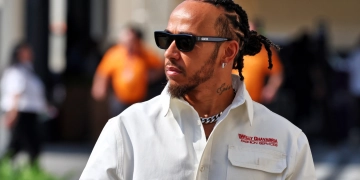Throughout the winter break Motorsport Week will be providing insight into the various aspects of the Formula 1 world. Today we take a look at the life and role of a commentator.
In every major sport the promotion of its core product is vital and the primary way of achieving this is through visual means. In a broadcast package there is typically a lead presenter and an array of pundits who preview, analyse and dissect the action. For the main event the action is usually described by one person with a microphone. But what it is like to be that person standing and staring at a screen, facing the task of relaying the unfolding and unpredictable events to thousands if not millions of viewers worldwide?
In Formula 2 and Formula 3, and for Formula 1’s Pit Lane Channel, that job falls to Alex Jacques. For the last five seasons Jacques has been the leading voice of Formula 1’s feeder series and is present in the paddock from Thursday morning through Sunday night.
“On Thursday we’ll record an F2 podcast and afterwards it’s mainly fact-finding in the various paddocks,” says Jacques on his build-up to the weekend. “Then we might film something for Fan TV, before trying to condense everything I learned from the teams and drivers into notes. Friday will normally be commentary for F2, F3 and Porsche Supercup practice and then F2/F3 qualifying in the commentary box with a bit of Fan TV punditry with Rosanna Tennant in-between sessions.
“Saturday is a fun combination beginning with more Fan TV, then there’s the first F3 race and the F2 drivers’ parade, which is basically 30 minutes of the drivers trying to unplug my radio while I try to interview them. Then it’s F1 qualifying for F1TV and then more or less straight into the F2 Feature Race. Sunday is an early start: F3 race two, the F2 Sprint Race, Porsche Supercup for the world feed and then occasionally a grid walk for Fan TV then the Grand Prix for the F1TV PLC. If I’m lucky I’ll fit lunch somewhere in there as well.”

That workload doesn’t just start upon entering the circuit gates on Thursday morning, nor does it stop once the final chequered flag is flown on Sunday.
“At the start of the season [preparing for commentary] is like revising for an exam because you’re learning helmets, pronunciations, background information etc,” opines Jacques, who will also act as W Series’ lead commentator in 2020.
“During the season I’ll do most of the prep early in the week. I like to have stats for every driver, and even though you won’t use most of it, it feels all wrong if you go on air without them. I’ll have wins, podiums, poles, fastest laps, last win, laps led and tweak that accordingly if they’re more likely to be fighting for minor points. Plus narrative stuff such as driver X pilots acrobatic planes in their spare time, which usually comes up during a red flag. If you’re going to Monaco or Baku you need more trivia because you know you’re getting delays to sessions! For a long lap like Spa I might add another few facts maybe from earlier in their careers because if they can’t get past at Les Combes you’ve got a while to wait for the Bus Stop.”
Jacques became “instantly hooked” on motorsport after watching the 1998 Belgian Grand Prix as a child and “read and watched absolutely everything to do with F1, F3000, Touring Cars, Rallying, CART, I loved the lot” as he pursued his dream of becoming a motorsport commentator. Post-university freelancing on local radio gave him a starting platform, and after working at a sporting agency and a national newspaper Jacques received the “incredible” opportunity to become the commentator for GP2 and GP3 – as it was – in 2015.
During that period a hatful of the current Formula 1 drivers have worked their way through the Formula 2 and Formula 3 ranks, giving spectators a glimpse of what the future may hold.

“Commentating on the talent in F2/F3 is like discovering a huge band before the rest of the world finds them, to see the drivers grow is a fantastic part of the job,” says Jacques.
“Esteban Ocon had swagger from day one. He was very assured but great to deal with behind the scenes as well. In 2015 I was very impressed with his ability to adapt his rivals’ weaknesses and exploit it, which is something we’ve seen him carry through into F1.
“Pierre Gasly was very open, he hadn’t won for over 1000 days at one point in 2016 and as a commentator you end up saying that stat more and more on air but he was always chatty and more honest than most. Some drivers can feel a bit robotic, Gasly always struck me as brilliant person who could also drive.
“Charles Leclerc was the most complete driver I’ve seen in the junior categories in my time. Mentally he was enormously in control, turning down F1 FP1s because he felt it unsettled his weekend showed his confidence within the Ferrari programme. He looked rapid in GP3, but then looked near unbeatable in F2. The confidence surge and some of his driving that year was thrilling, but what really stood out in 2017 was the week he lost his father. To turn up in Baku and take pole, and win both races on the road, was incredible. The emotional control he displayed around a street circuit during the worst week of his life showed remarkable mental strength. The whole F2 paddock was blown away by that.
“And finally I’d pick out George Russell; he beat Lando Norris, Alex Albon and Nyck de Vries in the highest quality championship for years, and didn’t get the hype those performances deserved. He’s a brilliant verbal communicator, there’s definitely natural leadership within him and I hope he gets a chance to use his speed in F1.”

Jacques sometimes flies solo but is typically joined in the box by a colour commentator in the form of an ex-driver.
“I’ve been lucky enough to commentate with some brilliant broadcasters,” says Jacques. “Jolyon Palmer is super sharp and really helped me in my first year, then you have someone like Davide Valsecchi who simply makes the whole thing more fun. With Davide we clicked instantly having basically met on air. He rocked up late and then kept punching me on the arm or slapping me on the back when something big happened and whilst it must have looked mad, the flow and rhythm was there from the very first race. You have to balance asking questions for everyone at home, but loads of times I’m genuinely curious about something. That’s one of the great parts of the job, getting answers from drivers who have lived it.”
Jacques’ place of work changes each weekend courtesy of Formula 1’s global status, giving him the chance to experience a variety of environments.
“Monza,” he says of the best commentary position. “The atmosphere is fantastic and the circuit echoes the history of the sport but the commentary boxes can be a real lottery. Some don’t have complete walls or all the floorboards in place but it’s still my favourite because you’re commentating from one of the oldest grandstands in sport. It’s a fantastic building and they used to present the winner’s trophy in the 1950s right in the middle of the stand.
“Meanwhile the worst commentary box would be Baku in 2018 with the wild wind. You knew it was safe but equally it’s only scaffolding and the box was shaking from side to side, I was beginning to feel seasick, thankfully the races that year were a good distraction.”
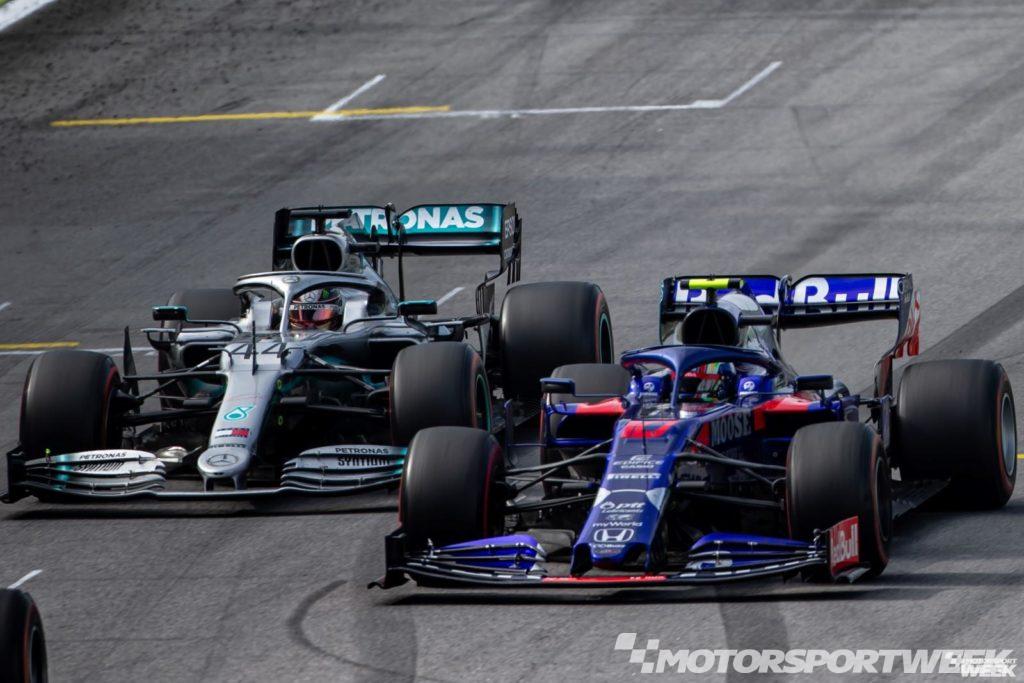
In commentating on hundreds of sessions across the world in various categories understandably there are a few moments which stick out for Jacques, though the highs also come with the tragic lows.
“Gasly’s two side-by-side finishes spring to mind as the best,” beams Jacques. “The first in 2016 was a GP2 race at Hockenheim where he just beat Raffaelle Marciello by under a tenth, and that was thrilling but he got disqualified after so it was all for nothing.
“So when he’s at Juncao on the final lap in Brazil last year, I’m thinking there’s no way he’s keeping Lewis Hamilton behind and on F1TV we had this glorious helicopter shot of them side-by-side and I nearly burst with excitement. You dream of doing races to the line in F1 but when it includes someone you’ve watched come through the ranks, beating the champion, it was fantastic. That was probably the most I’ve lost it on air.
“In F2 Artem Markelov provided so many outrageous moments, overtaking three cars in one corner in Austria was impressive. My favourite was at his home event where he went from 19th to the lead. He’s responsible for so many box office overtakes.
“The worst moment was Anthoine Hubert’s fatal accident in Belgium.
“From a commentary point of view, you have no extra information during something like that. You’re trying to push thoughts of the people involved out of your head, and trying to keep calm because you know everyone watching requires a cool head, no speculation, report the facts and warn about social media rumours. I felt a huge responsibility to strike the right tone for F2 and everyone watching. There’s no point in hiding it though: that week from Spa to Monza was horrendous for everyone. All the time not knowing whether Juan Manuel would pull through as well. Losing a character like Anthoine felt especially cruel. Hopefully everyone will remember the champion who cared about people no matter their standing in the paddock. We lost a really good guy and I hope his family, girlfriend and team can find peace going forward.”
Overall, though, how is it to be a commentator?
“It is the best job out there. There are marks to hit, you might have a set phrase for the start or a sign off but mainly it’s a strange combination of improvisation and instinct,” he ponders. “The adrenaline is always pumping live on air, so it’s more focusing on where the next major thing could come from rather than keeping yourself ready, it’s a fantastic feeling during the on air countdown, especially for a big race and I’m lucky that with F1 I commentate on a split screen so there’s always a story to work with and as we all know you could put F2 and F3 on in a supermarket car park and it would still be thrilling.”
